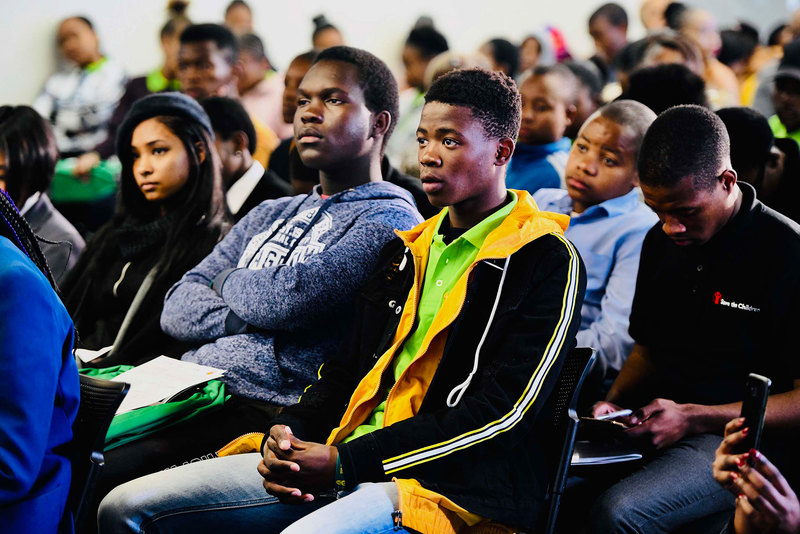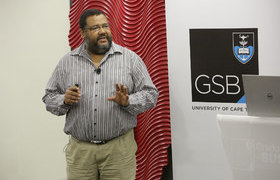UCT-led programme responds to critical need for youth support
30 July 2020 | Story Carla Bernardo. Photo GCIS. Read time 6 min.
A programme led by the University of Cape Town’s (UCT) Southern Africa Labour and Development Research Unit (SALDRU) is providing the basis for the implementation of an intervention to support South African youth who are not in employment, education or training (NEET).
The programme is called the Basic Package of Support (BPS) and was developed by a research consortium in consultation with various stakeholders, including young people. The project – now in its second phase – is led by SALDRU in collaboration with a range of partners, including UCT’s Abdul Latif Jameel Poverty Action Lab Africa, the University of Johannesburg’s Centre for Social Development in Africa (CSDA), the DG Murray Trust and The Jobs Fund. The Capacity Building Programme for Employment Promotion, which is funded by the European Union and based in the Government Technical Advisory Centre, provides funding and technical support.
“The BPS model appreciates that young people need a wide range of support services.”
The BPS was developed in 2019 and takes a positive youth development approach which recognises young people’s agency.
“It works with youth in the ecosystem of available government or non-profit programmes and services to enhance their navigation of the steps needed to realise their envisaged futures,” said Associate Professor Ariane De Lannoy, chief researcher at SALDRU and BPS programme lead.
“Importantly, the BPS model appreciates that young people need a wide range of support services to deal with the many challenges or deprivations they face.”
Two-pronged approach
De Lannoy explained that the BPS approach has two prongs.
The first is an ongoing connection with young people through high-quality one-on-one guidance counselling and peer support. This guidance is based on a comprehensive assessment of the young person’s needs, goals and challenges, followed by discussions about available pathways, the co-creation of an action plan, and support with active referrals to the necessary services or opportunities.
“Regular follow-up from counsellors supports them along the way and a physical ‘starter pack’ provides additional resources and enhances their sense of belonging,” she said.
The second prong consists of local and national partnerships between government, non-profit and private sector role players responsible for the well-being and development of young people.
According to De Lannoy, the programme does not aim to reinvent the wheel. Rather, it recognises the intensive investments to date and offers an interface to help connect existing programmes, services and resources to assist vulnerable youth to better navigate available opportunities.
Severe, shocking impact
De Lannoy explained that prior to the lockdown, which began in March, South Africa already had more than 8 million young people (18 to 35) who are NEET. These young people typically experience a multitude of deprivations, including food insecurity, poor health and geographic exclusion. These deprivations also intersect: for example, income poverty influences food security, which impacts health. Together the deprivations and their intersections complicate young people’s transitions from adolescence to adulthood.
“COVID-19 is now painfully sharpening the lens on these precarious situations,” she said.
This was evident in the findings of a recent survey conducted by SALDRU and the United Nations International Children’s Fund South Africa, in partnership with CSDA, the Children’s Radio Foundation, Youth Capital and Naspers Labs.
The survey, titled “The state of youth well-being in South Africa during the COVID-19 pandemic”, saw over 11 500 young people from all provinces participate.
“The need to reach out and provide support to youth who are NEET is now even more critical.”
Findings revealed that:
- many who were employed before lockdown worked in sectors hard hit by COVID-19 infections and lockdown closures
- the majority of the employed participants predicted that they would either lose their jobs after lockdown or weren’t certain if they’d still have work
- 69% indicated that they were no longer receiving their wage during lockdown or were only being paid in part
- 57% indicated that they were living in a household where only one or no other adult was earning an income during lockdown
- almost half indicated they had felt happy for less than a day.
In terms of the help needed, the top three immediate interventions requested by respondents were family food packages, a basic income grant and information on accessing income support.
“This reflects the severe and shocking impact of the pandemic on their livelihoods and security,” said De Lannoy.
Critical need
The SALDRU chief researcher explained that while many of the challenges highlighted by the participants were certainly exacerbated by the pandemic, they are not new. Over the last decade, government, civil society and the private sector have invested significantly in numerous programmes and interventions geared toward supporting youth, specifically in their transitions to adulthood. Often, the emphasis has been on education and employment.
“Yet, the dial has not shifted,” said De Lannoy.
According to insights from the BPS team, this status quo reflects that research and programmes are not engaging sufficiently with the complexities and linkages in young people’s realities and how these impact their life chances.
Thus, to enable young people to achieve their goals, the multifaceted and integrated strategy that is the BPS will be piloted in collaboration and coordination with the National Pathway Management Network stream of the Presidential Youth Employment Intervention.
It will support young people’s educational and employment transitions, recognise the interconnectedness of deprivations and seek to support their agency and resilience, which will be crucial following the COVID-19 pandemic.
“The need to reach out and provide support to youth who are NEET is now even more critical,” said De Lannoy.
 This work is licensed under a Creative Commons Attribution-NoDerivatives 4.0 International License.
This work is licensed under a Creative Commons Attribution-NoDerivatives 4.0 International License.
Please view the republishing articles page for more information.










